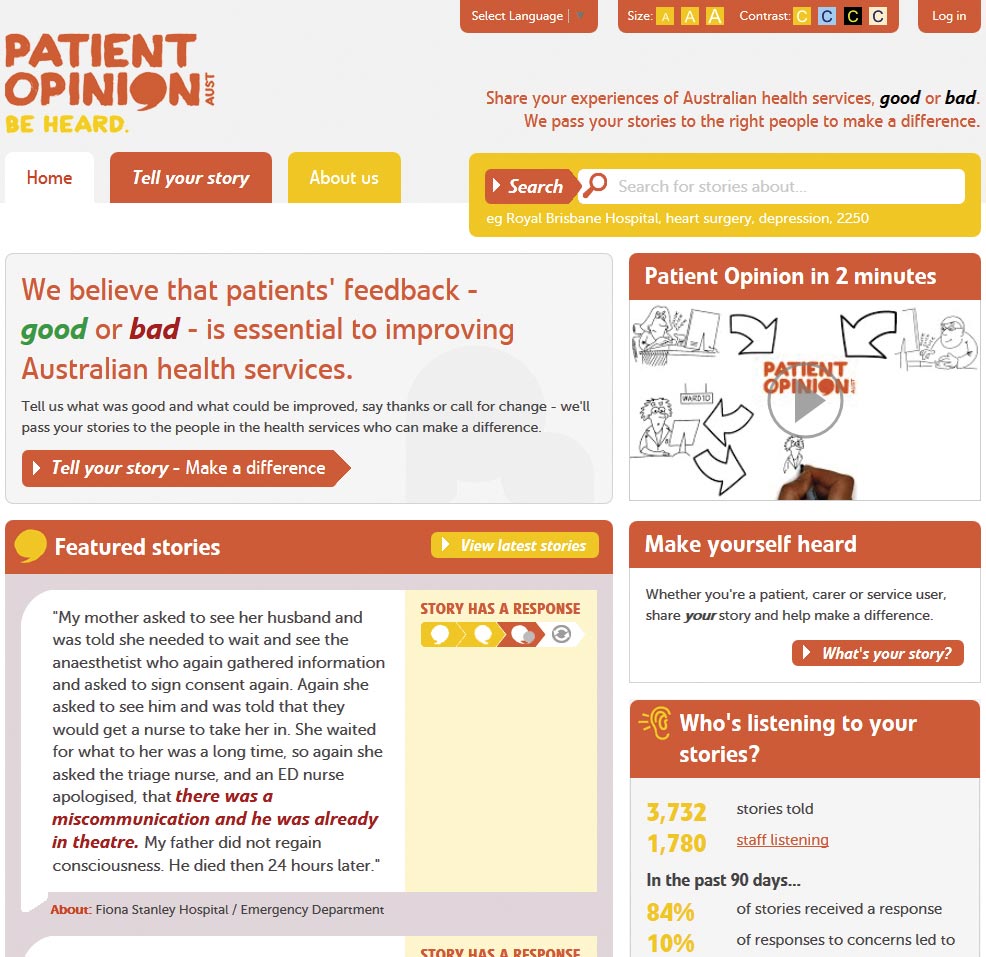 There’s an increasing number of digital and online platforms that allow a health consumer to tell their own story. Patient Opinion is one of them and the CEO of this not-for-profit, Prof Michael Greco, has some interesting things to say regarding online feedback platforms and their potential to make a significant difference in the medical sector.
There’s an increasing number of digital and online platforms that allow a health consumer to tell their own story. Patient Opinion is one of them and the CEO of this not-for-profit, Prof Michael Greco, has some interesting things to say regarding online feedback platforms and their potential to make a significant difference in the medical sector.

“The whole Patient Opinion concept began when two UK medical doctors felt that the existing rating sites were demoralising and not particularly constructive.”
“Most of them consisted of disgruntled individuals shouting out their grievances with no one listening to them. There should, ideally, be a quadruple focus in relation to patient websites and they are patient and staff experiences, outcomes and ‘cost’, with the latter definitely not confined to the financial bottom line.”
“It’s well accepted, despite some ongoing resistance, that patient experience is now part of the lexicon. It just can’t be relegated to the ‘soft’ side of medicine and hard financial data bears that out. In the US, 60% of a hospital’s income is linked with meeting patient expectations and, in tandem with that, about 2% of total budget is withheld until there’s clear evidence that it’s taking place.”
“And we’re talking millions of dollars here!”
“The medical environment is complex and anything resembling a ‘star’ rating system is far too blunt an instrument. There’s just too much happening in a hospital, they’re not restaurants or hotels where an entirely different system of measuring customer ‘experience’ is appropriate.”
“We’ve extended this model into Aged Care. Our affiliated website, Care Opinion has a strong focus on developing a conversation between residents, their families and the relevant organisations within the sector.”
“The former shadow Health Minister Tanya Plibersek has been supportive of what we’re doing, particularly within aged care. We’re confident that we’ll get a lot of traction here in Australia because this is very much a 21st century way of doing things. These are patients and residents, not ‘consumers’ and they just want their voices to be heard.”
One of the significant features of websites such as Patient Opinion is their high level of engagement with healthcare providers such as hospitals and aged care facilities. The funding model is underpinned by these organisations which see the value in subscribing to a reputable online platform. It also fulfils some of their obligations to welcome and respond to patient feedback.
“All the responses to patient stories are moderated by us, as is the initial story itself. They just won’t get published until we’re happy with them. We’ll often talk with a subscriber and coach them if their response is overly bureaucratic. In fact, we set up webinars for just that purpose.”
Hospitals obliged to listen
“These organisations are usually pretty keen to put it out there that Patient Opinion is the platform they use to drive feedback. You’ll see examples of that on their own websites and on their discharge letters, which makes it even easier for a patient to tell their story.”
“We’re happy to put responses from non-subscribers on our website and anyone is welcome to use a published response as a template. The reason we do this is that a good level of communication reduces the likelihood of a formal complaint and, as we all know, that can be a long, unwieldy and unproductive process.”
Michael sums up the essence of a patient feedback platforms such as Patient Opinion.
“We’re really seeking to present stories that resonate. That’s a big part of the reason we display a photograph of the person actually making the response because it establishes a connection. This model is far less adversarial than any complaints process. And it’s important to bear in mind that most people aren’t looking for a formal investigation. They just want to be heard and often it’s as much about helping others who may find themselves in a similar situation.”
“It’s so important to present a human face to a large organisation.”
Health Consumers’ Council
The Executive Director of the Health Consumers’ Council, Pip Brennan, is a big fan of online patient feedback platforms that focus on developing a relationship and encouraging a conversation. Pip is also pleased to see that not all patient stories are tales of woe.

“It’s interesting to see that about half of the patient stories posted on Patient Opinion are uniformly positive. Around 5% are quite critical in one way or another, and the remaining 45% vary in tone. Of course it’s never as simple as that because, as we all know, the medical system is both vast and complex.”
“This particular site is different from a lot of the others in that it’s got nothing to do with posting a rating for a service provider. Patient Opinion is much more about developing a relationship between a health service and a person who’s experienced that service, for better or worse. It’s a lot more than putting a score on the door!”
“The transparency of this model fosters a positive cycle of feedback and this is something I’ve had a lot of experience with at Health and Disability Services and the HCC. I know how the system works and, from a consumer’s point of view, the wheels of the complaint process can move very slowly.”
“Patient Opinion provides feedback in as little as 72 hours and there’s a two-way protection built into the model. Both the person telling their story and the responder are subject to moderation before the post is published. You can’t blurt out that Dr Jones is a maniac!”
The two-way street
“That just won’t be posted and, on the other side of the coin, a person who does have a valid grievance won’t receive an inappropriate response because that’s monitored as well.”
One of the real pluses of the system lies in its feedback loop.
“Here at the HCC we think this is a really positive tool for consumers and service providers alike. There’s a built-in ‘action cycle’ that flags when a story has been told and when a response has been made. And, probably most importantly, a green light appears when a change has been made.”
“All of these features have the added bonus of encouraging health providers to actually write better responses!”
“Patient Opinion has been in operation for a decade in the UK and has been going for five years here in Australia. It gets a big ‘thumbs up’ from me!”
In the light of the HealthEngine data controversy, Pip said that while there were plenty of opportunities arising with the advent of digital and online innovations, the protocol of exchanging data for money had become something of a curse.
One of the reasons that the HCC has embraced Patient Opinion is that their website is under a Creative Commons licence and the data can’t be ‘on-sold’ in any way.
“We recognise and appreciate the quick response by Health Engine regarding recent criticisms about massaged online reviews and unclear privacy policies. There seems to be, unfortunately, a tension between running a business and protecting consumer data. There also seems to be no doubt that non-profits are a safer repository for patient data than some other profit-driven models.”


